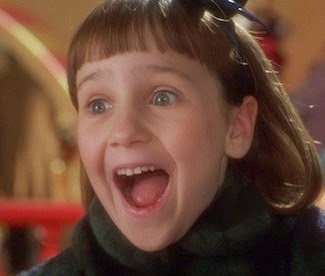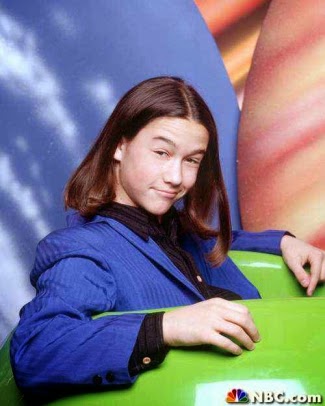 |
| Me in the film Dogville-- the largest role of my young career by far. |
She also establishes that she's no longer an actress herself (although she lends her talent superbly to the incredible podcast "Welcome to Night Vale," where she voices the character of The Faceless Old Woman Who Secretly Lives in Your House.") It's a well-written article, and Wilson makes some great points. And, to be fair, her acting as a kid was in much more of a spotlight than mine. But I still had some problems with the article. Wilson is no longer an actress-- and that's the right choice for her-- but I feel she errs in implying that it is the right choice for everybody. And while I have some problems with the article, I take more issue with the comments themselves-- which further this notion that all child stars are disasters waiting to happen.
But, this is a problem with the media more than child actors themselves. Every time a child actor gets into trouble, it's reported on because it's great news. The news doesn't do reports on the child actors who are doing really well. And I'm not talking about actors like Mara Wilson who left the business already. There are tons of actors who are in the business still who have successful careers even though they acted as children. Here's a few I can name off the top of my head: Christian Bale, Jason Bateman, Jeff Bridges, Leonardo DiCaprio, Jodie Foster, Ryan Gosling, Seth Green, Neil Patrick Harris, Ethan Hawke, Jonah Hill, Ron Howard, Scarlett Johansson, Anna Kendrick, Jennifer Lawrence, Joseph Gordon-Levitt, Anna Paquin, Natalie Portman, Elizabeth Taylor, Kenan Thompson, Kate Winslet, and Elijah Wood. Not to mention the kids from the Harry Potter films-- Daniel Radcliffe and Emma Watson in particular have taken on some really interesting projects and have been doing consistently great work to establish themselves as strong actors outside of their Potteresque identities. If these names are any indication, it should show how the life of a child actor is not a definite path towards doom and gloom.
But the false notion that child actors will all inevitably become drug addicts is not the only misconception that child actors face--I wasn't even aware of this misconception until later in my career. Instead, the biggest problem that child actors face is the fact that they're often not taken seriously. While actors might not always get along, the rehearsal process is generally a place where everyone is treated with respect. Now, I was lucky in that most of the people that I worked with were incredibly kind and generous, and many treated me with the same level of respect that they would treat any actor. But there were also many times that I found myself treated as less-than. Rather than give me benefit of the doubt, it was automatically assumed that I would not be as talented as the others in the room. Even though I auditioned for a part like everyone else, even though I was a card-bearing member of the acting union, the word "child" was more important than the word "actor." Once, I was in a play where I played a character with Asperger's Syndrome whose mother passes on early in the play. It was a difficult role, and the main character, and it is to date one of the most difficult roles I've ever had to play. At the end of the run, one of the actors confided in me that he had almost not accepted the role because he didn't think a child actor could have pulled the role off, but I stopped him from dropping out of the play after the first read-through, after it became clear that I wasn't just a random kid they had grabbed off the street. But while this actor's attitude towards me changed, not everyone's does. While most have treated me as a colleague, some of my thespian peers could never seem to get over my youth and could not take me seriously. They felt the need to hold my hand despite me consistently proving that I was up to the task as much as everyone else involved (especially impressive considering that I also had to do math homework on breaks).
The same year that Sharma would have been eligible, another young actor did receive attention from the academy, when Quvenzhané Wallis became the youngest nominee in the category of Leading Actress in a film. Her performance in Beasts of the Southern Wild was absolutely remarkable, and I for one cheered when her name was announced as a nominee. But, predictably, this was not the reaction from everyone. The reaction to her nomination can perhaps be best summed up by this article, entitled "Sorry, Quvenzhane Wallis, but Best Actress Oscar Nods Are for Big Kids." This article does not deny that Wallis gives a strong performance-- the author says of Wallis that "she's hugely magnetic, and she commands the screen to an extent most adult performers could only dream of." But this author nonetheless claims that Wallis should not have been nominated because "she's too young." She goes so far as to say that Wallis is not giving a performance...even though she's clearly playing a role who is not herself, is reciting lines already written in a script, and clearly making conscious choices the way any actor would. The author does address this, but claims that her successful performance was due entirely to her director, Benh Zeitlin. This might be true-- we will never know. But no one said the same thing about Barkhad Abdi, an Oscar nominee the following year for his work in Captain Phillips. Abdi also gives a fantastic performance, and was my choice for who should have won the award. Like Wallis, his nomination came from his very first acting performance (before the film, he worked as a cab driver). Who's to say that his director did not use editing to make Abdi's look performance better than it was? Again, we don't know, but we give him the benefit of the doubt the assume that Abdi's performance was a result of his own work. This benefit of the doubt is not applied to a young actor like Wallis simply because of her age. There can be no other reason.
This stigma can even extend to the actor after they've already grown up. I already mentioned Jennifer Lawrence as a former child actor, and I truly think people don't realize how young she is. Lawrence is, at the time of this writing, only 23, but the roles which have brought her to national attention have all been considerably older. In Silver Linings Playbook, a movie that was released when she had just turned 22, her character was already a divorcee. In American Hustle, she's married to Christian Bale (another child actor) who in real life is almost twice her age. Even in her work in the X-Men franchise, her character is supposed to be the same age as James McAvoy, who is 13 years older than her. Lawrence has managed to avoid the stigma against younger actors because she tackles adult roles, and it has served her very well (it doesn't hurt that she's incredibly talented). Meanwhile, an actor like Daniel Radcliffe might never be able to shake this stigma. Radcliffe's work in the early Harry Potter movies is kind of iffy, and initially I wasn't much of a fan of his performance. But over the years, he has grown into an incredibly talented actor-- not surprising given that he grew up acting with some of the very best thespians Britain has to offer. As already mentioned, Radcliffe has tackled some challenging roles, both in the world of theater and film. So has his co-star Emma Watson. Both have been praised for their choices of tackling more adult projects-- but you know they had to do this out of necessity. Even while proving his merit time and time again, Radcliffe seems to have trouble being taken seriously. While his work is well-received by critics and audiences alike, Radcliffe is still not able to shake his Harry Potter image. This morning, the Tony nominations were announced and, despite giving a solid performance in Martin McDonagh's The Cripple of Inishmaan, he was not nominated, even thought the show itself received multiple nominations. This is his second snub-- he was expected to be nominated a few years ago for his well-received performance in How to Succeed in Business Without Really Trying. His snub is especially egregious when one considers how much the Tonys really like to nominate movie stars. If he were just any movie star, Radcliffe would have been a shoo-in for a nomination at least one of these times. But since he's a former child star, he seems to be ignored by the Tonys. (Seriously, forget the complaints about Leonardo DiCaprio not getting an Oscar-- there should be a meme for Daniel Radcliffe trying to win a Tony).
 |
| Daniel Radcliffe in a most certainly adult role. |
I do understand why this stigma exists. There are some really terrible performances by child actors out there. Typically these kids are not even actors-- they're some producer's kid who is hired because those involved don't think they'll find a kid who's any better. And when people see these performances, it enhances the idea that children cannot act. It also doesn't help that the child actors on shows on Nickelodeon and Disney are generally directed to give over-the-top performances which rely more on enthusiasm than actual acting. But, just like with adults, there are bad child actors, and good child actors. And it's unfortunate how the instances of the bad inform opinions of the good. While this is certainly not the most important form of discrimination that is faced in this business, it certainly exists. And it's something to be mindful of. The next time you watch Beasts of the Southern Wild, appreciate how much faith is put in the, at the time, six-year old actress. And, more importantly, appreciate how admirably she rises to the challenge.



